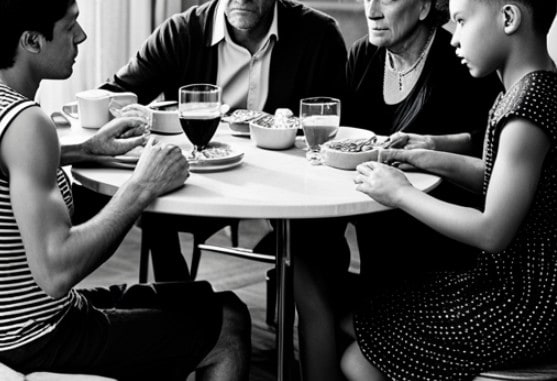In today’s society, it can be easy for parents to overlook the importance of teaching their children manners and gratitude. However, these essential life skills are crucial for building positive relationships with others and maintaining healthy mental well-being. Saying “please” and “thank you” not only shows respect, appreciation, and kindness towards others but also helps children learn how to communicate effectively.
This guide will provide practical tips and strategies for parents who want to teach their kids the value of good manners and gratitude. Whether you’re a first-time parent or a seasoned pro, there is always room for improvement when it comes to teaching children these essential skills.
The Importance of Teaching Children Manners
Manners play an important role in social interactions by guiding behavior towards others. Children who lack manners may inadvertently offend or hurt someone else’s feelings without realizing it.
By teaching your child how to say “please” and “thank you,” they learn how to communicate respectfully with others. It also helps them understand that their words have an impact on those around them.
Good manners can positively influence peer relationships as well as adult interactions later in life. When children are polite and respectful towards adults, they are more likely to receive positive attention from those individuals which can help build self-esteem.
The Benefits of Gratitude
Gratitude is an essential aspect of emotional intelligence that has been found to improve mental health and build stronger connections between people. By focusing on what we have rather than what we lack, we cultivate a sense of contentment that leads to better overall well-being.
Teaching your child the power of expressing gratitude through saying “thank you” teaches them appreciation for the things they have in life as well as the people who surround them. It helps foster a sense of empathy toward others’ efforts made on their behalf.
This guide will provide practical tips for teaching your child to say “please” and “thank you” consistently. By doing so, they will learn how to communicate respectfully with others and develop an attitude of gratitude that can positively impact their mental health and relationships throughout their lives.
Understanding the Importance of Manners and Gratitude
Why Manners are Important in Social Interactions:
Manners are a set of behaviors that are expected in social interactions. They create a sense of order, respect, and civility that benefits both individuals and society as a whole. Good manners help to build relationships by showing respect for others’ rights, feelings, and property.
They help to establish trust, which is critical for healthy communication and cooperation. Teaching children good manners at an early age sets them up for success later in life—both personally and professionally.
For example, polite behavior during job interviews can increase the chances of being hired or receiving a promotion. Similarly, being respectful towards colleagues can lead to better teamwork and productivity.
How Gratitude Can Improve Mental Health and Relationships:
Gratitude is the act of expressing appreciation or thankfulness towards someone or something. It has been shown to have numerous physical and mental health benefits—for both the giver and receiver. Studies have found that people who practice gratitude experience more positive emotions like happiness, optimism, and satisfaction with life.
Expressing gratitude can also strengthen relationships by creating positive emotions between individuals. It helps people feel acknowledged, appreciated, valued, loved—and thus more likely to reciprocate these same feelings back towards others.
Examples of How Saying “Please” and “Thank You” Can Show Respect, Appreciation, And Kindness Towards Others:
Saying “please” shows respect for others’ time or effort when making a request. It acknowledges that the other person has something valuable—a skill or object—that is worth asking for in a polite manner. Saying “thank you” demonstrates appreciation for an act or gift given by another person—whether it’s big or small—and communicates gratitude towards them.
This simple phrase goes a long way in building stronger relationships and fostering positive emotions between individuals. Saying “please” and “thank you” is also an act of kindness towards others.
It shows that you value their contributions or assistance, and are willing to acknowledge it in a polite manner. This can lead to improved communication, mutual respect, and a sense of community—all of which are essential for healthy relationships.
Teaching Kids to Say “Please”
Role-playing scenarios where they need to use the word
Role-playing is a great way to help young children learn how to use the word “please” in different situations. You can create scenarios where your child needs to ask for something politely using “please”. For example, pretending to order food at a restaurant, asking for help from a teacher, or requesting a toy from a friend during playtime.
Role-playing allows your child to practice using manners in a safe and comfortable environment. It’s important for parents to be patient and encouraging during these role-play scenarios.
Praise your child when they remember to use “please”, and gently correct them when they forget. By positive reinforcement, you can help your child develop good habits of saying please.
Rewarding them when they remember to use it
Another effective strategy is rewarding children when they remember to say please. Positive reinforcement is an excellent way of encouraging good behavior in children. When starting this method with younger children, set simple goals like saying please at mealtime or asking nicely for toys and praise or reward them for their efforts.
You can give them stickers or small treats as rewards that motivate them positively enough without spoiling their appetite. As time goes on and your children progress through their manners journey you can increase the rewards size by offering additional TV time, trips, or activities that they may enjoy so long as the behavior is consistent.
Modeling Good Behavior by Using It Yourself
Children learn more by observing what their parents do than what we say; this means that modeling good manners will reinforce values in kids more than telling them about it. Therefore parents should also make an effort towards using polite words like please consistently while speaking with kids or other elders around the household creating an environment where please becomes natural language rather than an obligation. This will not only encourage kids to use the word more often but also help develop their vocabulary.
Tips for Reinforcing the Habit as They Grow Older
As children grow older, it’s important to reinforce good manners by explaining why it’s important. Explain that politeness and respect are fundamental values that will help them in life.
Children need to understand that using please is a sign of respect for others and their feelings. It may also be helpful to encourage them to practice manners in different settings like with grandparents, teachers, or when meeting new friends.
The more they practice and implement manners in various scenarios, the easier they will become part of their everyday behavior. Parents should always keep in mind that teaching kids etiquette takes time and patience.
Don’t pressure your kids too much; instead, make manners a crucial part of your daily routine while modeling good behavior consistently. With time and patience, you’ll see progress in your child’s etiquette skills through their polite actions.
Teaching Kids to Say “Thank You”
Strategies for teaching young children to say “thank you”
Saying “thank you” is a simple gesture yet is important for the development of social skills and nurturing relationships. Young children may not understand why they need to say thank you or how it can help them in their interactions with others.
As a parent, it’s your responsibility to teach your child the importance of expressing appreciation towards others. One way to do this is by informing them that saying “thank you” shows kindness and respect.
Praising them when they remember
Reinforcing positive behavior in kids is an effective way of encouraging good habits, including saying thank you. Praise your child each time they express gratitude towards someone.
You can do this by thanking them back or telling them how happy it made the person feel when they said thank you. This not only motivates your child but also makes them feel appreciated for making someone else feel appreciated.
Helping them write thank-you notes or draw pictures
Another way to help young children express gratitude is by assisting them in writing thank-you notes or drawing pictures for those who have done something special for them. It can be as simple as writing a note thanking their grandparents for sending birthday gifts or drawing a picture for their teacher after receiving praise from her at school. Not only does this encourage gratitude, but also helps children develop their writing and artistic skills.
Making a game out of finding things to be thankful for
You can also make expressing gratitude fun and interesting by creating games around it, such as finding things to be thankful for each day before bedtime or dinner time conversations about what everyone is thankful for that day. This will instill the habit of looking at the positive side of life and appreciating everything around us while also encouraging conversation and bonding.
Conclusion
Teaching kids to say “thank you” is an essential life skill that helps them develop healthy relationships and create a positive attitude towards life. The strategies mentioned above can help parents guide their children in expressing gratitude, which in turn can improve their social skills, emotional well-being, and overall quality of life. With patience, consistency, and encouragement, parents can raise children who not only say “thank you” but truly understand its value.




